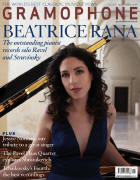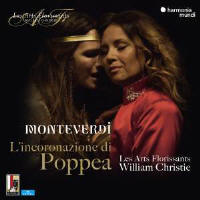Texte paru dans: / Appeared in: |
|
|
Outil de traduction (Très approximatif) |
|
|
Reviewer:
David Vickers William Christie has conducted several productions of Poppea, including a staging by Pier Luigi Pizzi filmed in Madrid in 2010 (Virgin/Erato). At last year’s Salzburg Festival Christie revisited the opera with a mostly different cast (three singers reprise their roles) for a production by Jan Lauwers, who explains it as ‘a perverse game … the music is of a “heavenly” beauty, even seductive, which leads you into loving the bloodthirsty protagonists’. Cruelty and violence are explored copiously, but the power-crazed protagonists are unlovable on this occasion. Kate Lindsey’s intensely agitated Nerone has neurotic restlessness and edgy singing that oozes threatening instability – a relentless characterisation that leaves little room for lyrical finesse. Sonya Yoncheva’s ruthless Poppea is not to be trifled with, although towards the end she appears afraid of what she has got herself into but cannot resist the lure of the throne – prioritisation of her determination and thirst for power neglects lighter charm and whispered seductiveness. The closing duet is vibrant and unsettling, is low on intimacy, and is blemished by unsteady intonation. Renato Dolcini has eloquent gravitas with a hint of the philosopher’s stubborn pomposity but there is dignity in Seneca’s acceptance of destiny (even if the lowest E is lacking). Carlo Vistoli’s Ottone is aptly indecisive and weak, scarcely deserving Ana Quintans’s resolute Drusilla. Stéphanie d’Oustrac’s performance of the haughty Ottavia’s ‘Addio Roma’ is profoundly moving, with time standing still at a long weeping silence before her final utterance. Arnalta’s lullaby ‘Oblivion soave’ is sung with hushed tenderness by Dominique Visse, whereas her last scene of gloating shows the countertenor-in-drag specialist’s extraordinary talent for exaggerated comedy. Marcel Beekman offers ample comic absurdity and an impressively polished high tenor register as Ottavia’s Nurse. Numerous smaller roles are performed with characterful vivacity. The lucidity of the drama is smudged by over-activity on stage from experimental dancers doing an inordinate amount of experimental dancing, often in various states of undress, and always with one of them at centre stage whirling in perpetual circular motion until the next dancer on the rota gives them a cuddle and relieves them. Characters with no business being on stage lurk persistently without purpose and contradict theatrical sense. Ottone does not disguise himself in Drusilla’s clothes for the attempt on Poppea’s life, rendering the rest of Act 3 inexplicable. Some of the numerous cuts are obtrusive. For example, lines in the confrontation between Nerone and Seneca are missing, Ottone’s reluctant acquiescence to Ottavia’s blackmail is removed, and so are several passages from his attempted murder of Poppea at the end of Act 2. Drusilla’s heroic self-sacrifice when accused of attempted murder is reduced to a bare minimum and much of Ottone’s courageous interruption to save her is missing – even their trial is removed. An integral virtue of the production is the prominence accorded to instrumentalists, divided between two onstage shallow pits at the forestage. Numerous continuo players (three theorbos, harp, two viols, cello, dulcian, double bass and two keyboardists including Christie) pay avid attention to what is happening further up on stage. Upper instruments including recorder and two cornettos play sinfonias spiritedly, and occasionally they double the voices – a practice that sometimes works but regrettably distorts the three-part madrigalian lament ‘Non morir, Seneca, no’. This unadulterated live recording is issued as a small hardback book containing three CDs and a DVD. Whether you want to concentrate on purely musical and textual dimensions using the audio-only format and the libretto or to engage with attributes of the interpretation that emerge more clearly from the visual production, the combination of both is an immersive experience. |
|




